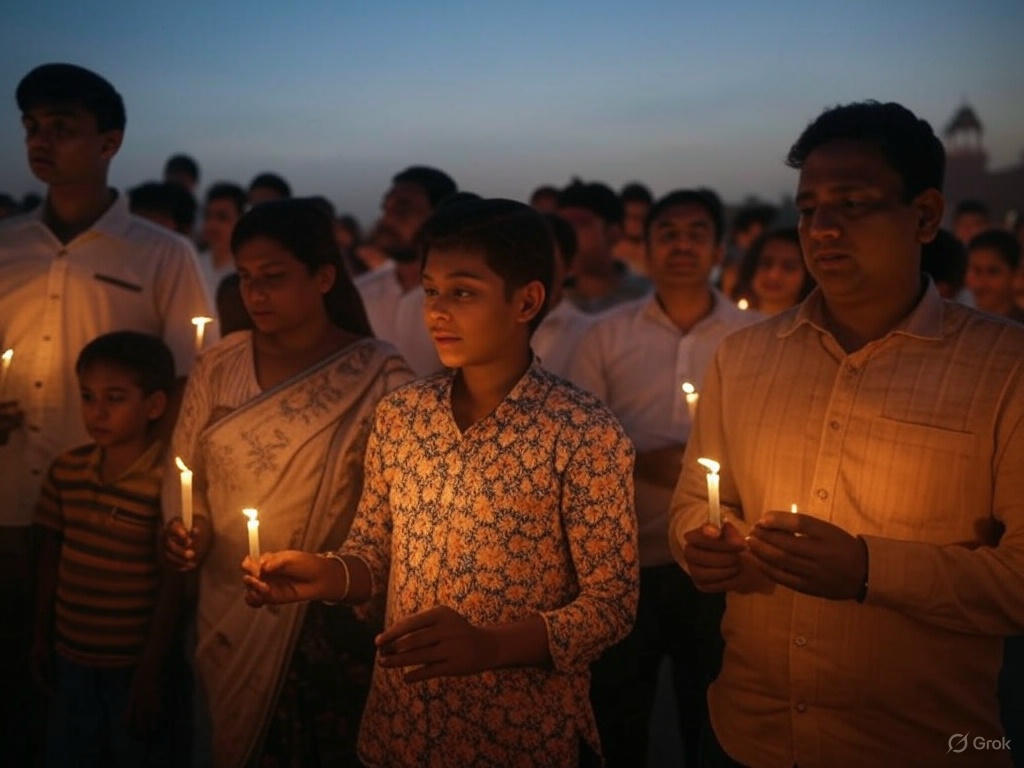The tranquil meadows of Pahalgam, a jewel in Kashmir’s crown, have been scarred by a horrific terrorist attack, thrusting India into a geopolitical maelstrom. On April 22, 2025, 26 lives, mostly tourists, were lost in Baisaran Valley, shattering the region’s fragile peace. As India mourns, tensions have skyrocketed with a provocative threat from Pakistan Peoples Party (PPP) Chairman Bilawal Bhutto-Zardari. Standing by the Indus River, he declared, “Either our water will flow, or their blood will.” This bold statement, tied to India’s suspension of the Indus Waters Treaty, has inflamed a nation already reeling from grief. In this gripping narrative, we delve into the escalating India-Pakistan conflict, India’s resolute response, the fears gripping ordinary citizens, and the surge of patriotism uniting a billion hearts.
Pahalgam, a haven for tourists seeking Kashmir’s breathtaking landscapes, was forever changed by a brutal attack. On a crisp Tuesday morning, gunmen from The Resistance Front (TRF), a proxy of Pakistan-based Lashkar-e-Taiba, targeted unsuspecting visitors in a calculated assault. The attackers’ chilling method—checking victims’ identities by unzipping trousers—revealed the depths of their brutality. Among the fallen was Syed Adil Hussain Shah, a pony ride operator who heroically shielded tourists, sacrificing his life. His courage inspires, yet underscores the human cost of terror.
The nation was stunned. Candlelight vigils lit up cities,
and protests flared outside Pakistan’s high commission in London, where the Indian diaspora waved tricolors, demanding justice. Social media erupted with #PahalgamTerroristAttack trending worldwide. For ordinary Indians—families planning vacations or locals dependent on tourism—the attack sparked deep fear. “We thought Kashmir was safe,” says Priya Sharma, a Delhi schoolteacher. “How do we trust again?” Her words reflect a shared anxiety: the dread of violence resurfacing in a region scarred by decades of unrest.
Bilawal Bhutto’s Provocation: Fueling the Fire
As India grieved, Bilawal Bhutto-Zardari’s words added fuel to the fire. Speaking in Sukkur on April 25, 2025, he accused India of exploiting the Pahalgam attack to mask domestic failures. His threat—“Dariya mein ya toh hamara paani bahega, ya phir unka khoon”—was a direct challenge to India’s sovereignty, claiming the Indus River as Pakistan’s lifeline. The statement was a response to India’s suspension of the 1960 Indus Waters Treaty, a move prompted by Pakistan’s alleged support for cross-border terrorism.
The treaty, a pillar of India-Pakistan relations, governs the sharing of six rivers. India’s decision to halt it was a bold retaliation, but Bhutto’s fiery rhetoric escalated the stakes. “He’s rallying his base,” says retired Colonel Vikram Rana, a defense analyst. “But threatening a nuclear-armed neighbor is dangerous.” For everyday Indians, Bhutto’s words feel like a personal affront, mocking their grief and testing their resilience.
India’s Iron-Fisted Response: A New Era of Retaliation
India’s response was swift and uncompromising. Prime Minister Narendra Modi vowed to “hunt down” the perpetrators, promising to pursue them “to the ends of the earth.” The government implemented stringent measures: suspending Pakistani visas, sealing the Attari border, and downgrading diplomatic ties. The Indian Army deployed Dhruv helicopters for counter-terror operations, and elite Para(SF) commandos reportedly conducted a covert raid near Lahore, targeting a safe house linked to the attack’s masterminds.
The boldest move was India’s plan to choke Pakistan’s water supply. Jal Shakti Minister C.R. Paatil announced that “not a single drop” of Indus water would reach Pakistan, a strategy that could devastate its agriculture-driven economy. This three-step plan, still in motion, has rattled Islamabad, with Pakistan’s Senate dismissing India’s accusations as “baseless.” Yet, India stands firm, bolstered by U.S. support urging New Delhi to eliminate the terrorists.
The Common Man’s Fears: Caught in the Crossfire
For ordinary citizens, the rising tensions are a nightmare. In In border villages of Punjab and Rajasthan, families like Ramesh Kumar’s live in constant fear. “We hear fighter jets at night,” he says, his voice trembling. “If war comes, we’ll suffer first.” In Kashmir, the attack has crippled tourism. Pahalgam’s vibrant streets are now eerily quiet, with heavy security replacing the hum of visitors. Local shopkeeper Bilal Ahmed laments, “Tourists were our lifeline. Now, we’re cursed again.”
Across India, Kashmiris face a different terror: reprisal attacks. In cities like Jammu and Delhi, reports of harassment against Kashmiri students and traders have surged, fueled by misplaced anger. “I’m Indian, but they see me as the enemy,” says Aisha, a Srinagar-born student in Bangalore. This division fuels fears that India’s social fabric is fraying, even as leaders call for unity.
Patriotism’s Double-Edged Sword
Amid the turmoil, patriotism has surged, uniting Indians in shared resolve. From social media campaigns to street protests, the tricolor flies high, driven by anger over Pahalgam and Bhutto’s provocation. “This isn’t just about water or treaties,” says Rohan Gupta, a Mumbai IT professional volunteering for relief efforts. “It’s about our pride, our people.” Stories of heroes like Syed Adil Hussain Shah have galvanized the nation, with Maharashtra’s government pledging Rs 5 lakh for his family.
Yet, patriotism can be a double-edged sword. Rahul Gandhi’s call to “stand united” against divisive terrorism highlights the risks of jingoism. In the heat of national pride, innocent Kashmiris and minorities face suspicion, threatening the unity India needs. “We’re all hurting,” says Priya Sharma. “But hating each other won’t heal us.” The challenge is to channel patriotism into resilience without letting it spiral into vengeance.
A Nation at a Crossroads
As India and Pakistan exchange fire across the Line of Control, the world watches anxiously. The United Nations has urged “maximum restraint,” while Iran’s foreign minister offered mediation. But with both nations entrenched—India with its punitive measures and Pakistan scrapping the Simla Agreement—the risk of escalation looms. For the common man, the stakes are deeply personal: safety, livelihood, and the hope for peace.
Bilawal Bhutto’s threat may have been a calculated jab, but it has awakened a nation’s fury. India’s response—unyielding and bold—marks a new chapter in its fight against terrorism. Yet, as patriotism surges, so does the need for unity and restraint. In the shadow of Pahalgam’s tragedy, India stands at a crossroads, balancing grief, pride, and the dreams of a billion. Will it rise above the provocation, or will the Indus run red? Only time will tell.
---










0 Comments